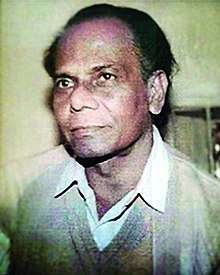Satya Saha
Satya Saha (25 December 1934 – 27 January 1999) was a Bangladeshi composer, and musician. His notable composed songs are "Chena Chena Lage" by Shyamal Mitra, "Dukkho Amar Basor Raater Palonko", "Chhiti Dio Protidin" by Sabina Yasmin, "Mon Bole Tumi Asbe", "Rupali Nadire", "Bondho Hote Cheye Tomar" by Khurshid Alam, "Akasher Haate Ache" by Shammi Akhter, "Tumi Ki Dekhecho Kobhu" by Abdul Jabbar, "Oi Dur Digonte", "Mago Ma Ogo Ma" etc.[1] He earned three Bangladesh National Film Awards in 1994, 1996, and 2001 in music director and composer categories. In 2013, he was awarded Independence Day Award after his death. He was the father of musician Emon Saha and film director Sumon Saha.
Satya Saha সত্য সাহা | |
|---|---|
 | |
| Background information | |
| Born | December 25, 1934 Patia, Chittagong, Bengal Presidency, British India |
| Died | January 27, 1999 (aged 64) Dhaka, Bangladesh |
| Genres | film score, techno, fusion, folk |
| Occupation(s) | Music director, composer, record producer |
| Instruments | keyboards, vocals, guitar |
| Years active | 1956–1997 |
| Labels | Sangeeta, Ektaar, Deadline music |
| Associated acts | Khan Ataur Rahman, Amjad Hossain |
Early life
Saha's father was Prasannakumar Saha. He started learning and rehearsing music from his uncle Rabindrapal Saha.[2] He passed B.A. from Vidyasagar College in 1951–1952.[3]
Career
Saha started his career as an assistant of composer Panchanon Mitra at Radio's Dhaka Station in 1956. From 1964 to 1999, he directed music in about two hundred different films and produced twenty films.[2]
Filmography
- Sutorang (1964)
- Janajani (1965)
- Rupban (1965)
- Fir Milebge Ham Duno (1966)
- Bhawal Sanyasi (1966)
- Kagazer Nouka (1966)
- Gunai Bibi (1966)
- 13 Number Feku Gostagar Lane (1966)
- Saiful Mulk Badiuzzaman
- Aina O Abashishta (1966)
- Aparichita
- Etotuku Asha (1968)
- Binimoy (1970)
- Dhire Bohe Meghna (1973)
- Alor Michil (1974)
- Nayanmoni (1976)
- Surjakonya (1976)
- Puroshkar (1980)
- Mohanogor (1981)
- Aguner Poroshmoni (1994)
- Ajante (1996)
- Dipu Number Two (1996)
Awards
- Bachsas Awards – 1974
- Bangladesh National Film Awards (1994, 1996, 2001)[4]
- Independence Day Award (2013)[5]
Death
Saha died on 27 January 1999 in Dhaka.[6]
References
- ঈদ আনন্দে সত্য সাহার গান. Kaler Kantho (in Bengali). 15 August 2011. Retrieved 11 October 2015.
- Khalid Hasan Komol. "Satya Saha". Banglapedia. Retrieved 12 October 2015.
- সত্য সাহা (in Bengali). Archived from the original on 4 March 2016. Retrieved 8 July 2017.
- Kamruzzaman (13 October 2009). জাতীয় চলচ্চিত্র পুরস্কার কি আটকে যাচ্ছে?. Prothom Alo (in Bengali). Retrieved 12 October 2015.
- Fahud Khan (5 March 2013). প্রয়াত সত্য সাহা পাচ্ছেন স্বাধীনতা পদক. Priyo News (in Bengali). Retrieved 12 October 2015.
- সত্য সাহা স্মরণে 'গান চিরদিন'. The Daily Samakal (in Bengali). 23 January 2012. Retrieved 12 October 2015.
External links
- Satya Saha on IMDb